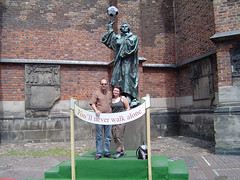Jean and Catherine (nice to hear from you again!) have both tagged me. It's taken me some time to reply to this challenge, but here we go - five things you didn't know about me:
-
I once served in an electronic warfare unit in the West German army, and had to learn some basic Russian - our task was to listen in to Red Army transmissions in then-East Germany, presumably to work out if and when the Soviets were going to attack. Of course they didn't, and in fact during my time in the army the wall came down and the whole exercise became fairly pointless. (Well, you probably did know that one if you've read "The Redundant Spy"...)
-
 One of my ancestors was a disciple of Martin Luther (that Martin Luther, who started the reformation). Which is something to be proud of, I guess, even if that whole religion thing didn't stick - my family have been non-believers for a couple of generations now. These days, the closest I'm getting to churches is sightseeing - especially if there's a suitably decorated (for the 2006 World Cup) Martin Luther statue outside.
One of my ancestors was a disciple of Martin Luther (that Martin Luther, who started the reformation). Which is something to be proud of, I guess, even if that whole religion thing didn't stick - my family have been non-believers for a couple of generations now. These days, the closest I'm getting to churches is sightseeing - especially if there's a suitably decorated (for the 2006 World Cup) Martin Luther statue outside. -
My first degree was in Physics - I completed the Vordiplom ("pre-diploma") at the Universität Hannover. I didn't go on after I realised just how impossible it would be to get to any of the really interesting stuff (like astrophysics), but I feel the two years of foundational maths and physics I studied still stand me in good stead even as I work in Internet studies - on the one hand, because it gave me a certain amount of technical and technological knowledge which is still very useful, but more importantly because the very systematic process of building up the edifice of advanced maths from the basic act of defining 1 and 0, which we encountered in our lectures, provides great training for logical, coherent, and well-structured argument in any discipline.
-
Some of my vocabulary might have faded somewhat in recent years, but I'm still able to read a good deal of ancient Greek; I learnt the language (along with its inferior cousin, Latin) between grades 7 and 13 at school. And what a beautiful, clear, and versatile language it is - few other languages are as well-designed and systematic as this. (I guess I'm referring here mainly to the Attic Greek as a kind of mainstream 'high Greek' - the regional dialects, and more recent forms of Greek, simply don't reach the perfection of the language of Socrates and Platon).
-
On and off, since my teens, I've been a reader of the German-language Perry Rhodan series - at 45-something years, the longest-running weekly series of (continuous) science fiction stories in the world. Written by a collective of authors (which necessarily has changed over the years), the story has taken us from the first manned moon landing (predicted, at the start of the series in the early 1960s, fairly accurately for 1971) by the eponymous Perry Rhodan, and his encounter with a stranded alien spaceship, all the way through to the discovery of life-prolonging devices, the rise and fall of galactic empires, the search for the origins of life and sentience, and further on to ... well, I can't tell you yet. Having started in the 80s, paused in the 90s, and rediscovered the series in the Noughties, I'm only just approaching episode 1000 - hardly close to mid-way to the Perry Rhodan present (and, of course, new episodes are still published every week!). And that's not even counting the ancillary series and other publications which are also available now. Surprisingly, except for a pretty hokey Italo-German co-production from the 1960s, none of this wealth of stories has ever been turned into a movie, but fans are still hoping - and fans, indeed, have become a major driver of Perry Rhodan lore over time: check out the Perrypedia wiki, for example. (Most of this stuff, I'm afraid, is in German - an English translation of the series for the U.S. market, in the 1960s, didn't last much beyond the 100th episode. There is a condensed English summary of the first 1800 episodes, though!)
Hmm, whom to tag now? Jo, Michelle?












